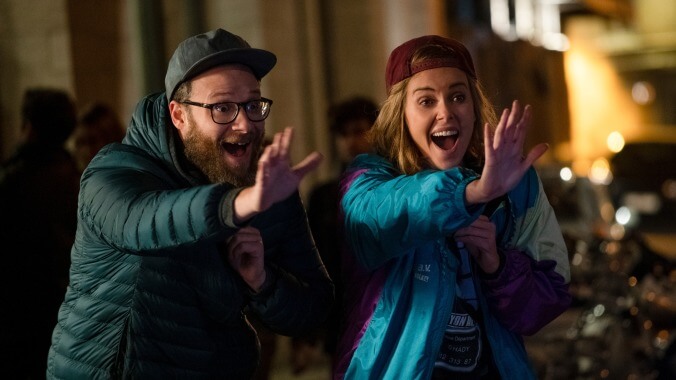Seth Rogen woos Charlize Theron in the half-assed political rom-com Long Shot

Seth Rogen rose to fame through a Cinderella story for the modern American schlub. The poster for Knocked Up made him the butt of the joke: “What if this guy got you pregnant?” it asked over a headshot of the actor, looking young, dumb, and dazed. We were meant to chuckle at the supposed implausibility of the premise, in which a stocky stoner geek-bro woos a beautiful, successful, professionally ambitious woman (albeit one who’s kind of a “killjoy,” as costar Katherine Heigl fairly complained). But Rogen got the last (signature sputtering) laugh, because the movie itself made him a star. Audiences really bought his love story. And they accepted him as a new kind of romantic leading man: the soulful slacker cutup, providing an aspirational model for deeply average dudes everywhere. (If this guy could get her pregnant, there’s hope for us all, etc.)
Rogen’s latest, Long Shot, pushes that idea to a new extreme of underdog wish fulfillment. It’s another odd-couple romantic comedy, pairing the funnyman with someone who—by superficial standards at least—is way out of his league. His love interest, played by a game Charlize Theron, isn’t just successful, professionally ambitious, and every bit as strikingly beautiful as, well, Charlize Theron. She’s also, arguably, the most powerful woman in the world: the U.S. secretary of state, preparing to embark on a campaign for the presidency. The fun here, ostensibly, is in seeing another quintessentially Rogen goofball triumph over the odds, his romantic upward mobility pulling him into the glamorous world of international politics. But laziness, a common flaw of this star’s man-child characters, seeps into the whole movie: It can’t be bothered to convince us that this particular goofball could or even should win the girl.
At least Long Shot acknowledges, more explicitly than usual, that it’s a kind of adolescent fantasy. Fred Flarsky (Rogen), a political reporter who impulsively quits his Vice-style job after a big corporate takeover, has harbored a crush on Charlotte Field (Theron) since he was a kid and she was his slightly older, earnest teenage babysitter. (This being a Rogen film, the flashback hinges on an untimely boner.) The two reunite by chance at a New York gala event—him comically underdressed, her the center of prestigious attention. Impressed by his moxie and conviction, Charlotte offers Fred a job as her new speechwriter, even though he has no experience with that kind of writing. And as the two embark on a whirlwind world tour, promoting an ambitious environmental plan designed to serve as a springboard for Charlotte’s candidacy, professional kinship shades into an increasingly mutual attraction.
It’s not an awful idea for a rom-com: a kind of gender-flipped American President, adapted to Rogen’s particular brand of profane, wiseass verbal humor. Directed by Jonathan Levine, who oversaw one of the star’s very funniest performances, in The Night Before, Long Shot has its effective screwball moments, most of them built on the fish-out-of-water absurdity of a Brooklyn millennial doofus dropped onto the sidelines of Washington high-stakes diplomacy. But while Aaron Sorkin made the Oval Office and campaign trail feel like real environments, this film’s screenwriters—sitcom veteran Dan Sterling and The Post’s Liz Hannah—exhibit what might generously be described as an abstract understanding of the political world. Half-assing its high concept, Long Shot forgoes jokes specific to its milieu in favor of something closer to the Rogen formula. That means an extended cameo by Boys II Men—catering to the actor’s nostalgia, the target audience’s, or both—and lots of pop culture name-drops passing as punchlines. There’s also the usual drug gags, including an ecstasy trip that probably counts as the film’s most inspired set piece.
What Charlotte supposedly sees in Fred is courage of conviction: He still believes in things, mirroring her teenage idealism back at her and keeping her honest. What exactly Fred believes in is tougher to pinpoint—his wokeness seems more blustery and performative than rooted in any particular philosophy. Though it opens with the character crashing a white supremacist gathering, Long Shot on a whole feels removed from the present; nominally liberal slant aside, it’s curiously apolitical for a movie about a woman running for president in 2019. Charlotte’s POTUS, a former TV star played by Bob Odenkirk, is the vaguest of Trump analogs: all the brain-dead narcissism, none of the fascistic tendencies. And instead of Fox News, there’s a fictional stand-in, run by a Rupert Murdoch type (Andy Serkis, broadly overacting under grotesque prosthetics). The plot eventually pivots around whether Charlotte will sell out her own plan to curry political favor. The irony is that Long Shot ends up feeling just as compromised in its caution, like a centralist Democrat terrified of alienating any potential voters. (That it never even identifies her party is telling.)
Theron, though, is marvelous. She conveys the poise, intelligence, and compassion that would make Charlotte a viable candidate, all while meting out glimpses of the down-to-earth person you could see actually falling for someone like Fred. If the two stars have chemistry, she goes above and beyond generating it. At the same time, though, Charlotte is such an appealing character that it throws into sharp, unflattering relief just how unexceptional her prospective partner is. That’s the big problem with Long Shot: not that it asks us to believe an impossible romantic fairy tale, but that it does nothing much to convince us that Fred is worthy of the fairy-tale ending. We’re meant to love him because he’s played by Seth Rogen, lovable romantic-comedy star of Knocked Up! But Charlotte is slumming with Fred. She deserves an actual Seth Rogen character, not this indignant, indistinctly progressive outline of one. We do, too.